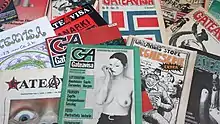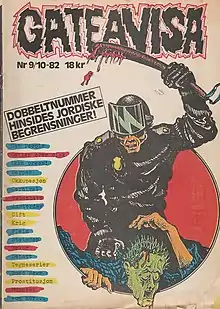Gateavisa
Gateavisa (meaning Street News)[1]is Norway’s first modern radical countercultural magazine. In 1970[2] the first issue was published by an anarchist community using an occupied building in Oslo as their editorial office. Since then it has been Norway’s only wide-reaching publication rooted in anarchism. This makes Gateavisa not only Norway’s oldest radical countercultural publication but also one of the world’s oldest continuously published anarchist magazines.
The magazine covers everything from fine arts, music and pop cultural matters to serious news topics and academics. Historically it's one of the leading sources when it comes to providing a foundational and radical critique of the Norwegian society.
Gateavisa is known for its provoking satire, unorthodox journalism, underground comics, short stories, and poetry. Society, culture, and history have been viewed with a radical non-affiliated lens rooted in the anarchist tradition. New subcultures and cultural expressions have often first been introduced to the public through the pages of Gateavisa. Radical ideas and movements national as well as international have been presented and provided with context and history before being interpreted and critiqued. You will find interviews with whomever the staff finds interesting or funny. It may be anyone from activists, a criminal, a local original, freak or vandal, but there will also be interviews with artists, musicians, writers, and thinkers both national and international.


The rejection of moralism and censorship has been central since Gateavisas founding. The publication has consistently been opposed to drug prohibition and any form of kink-shaming and oppression of sexual minorities, as well as capital, power and naturally, the police. Gateavisa has always advocated in favour of prostitutes, S&M, porn actors (but against their exploitation) and pornography.
All of the publication’s different adorations have regarded all and any authority and hierarchy as suspicious and therefore one of Gateavisas enduring themes have always been a critique of power, and a pragmatic scepticism regarding all formal institutions.
References
- A Cultural History of the Avant-Garde in the Nordic Countries 1950-1975. BRILL. p. 818. ISBN 978-90-04-31050-6. Retrieved 23 December 2016.
- Western Esotericism in Scandinavia. BRILL. 31 March 2016. p. 307. ISBN 978-90-04-32596-8. Retrieved 23 December 2016.
